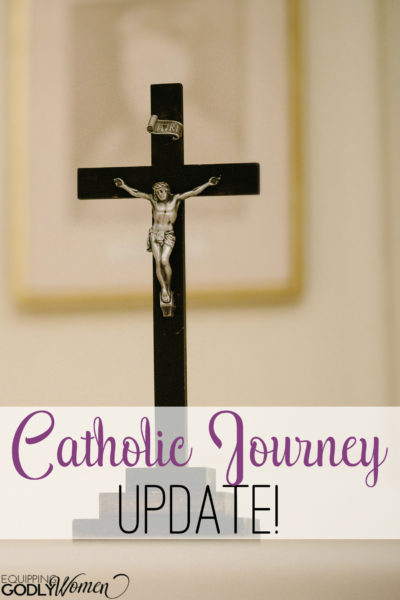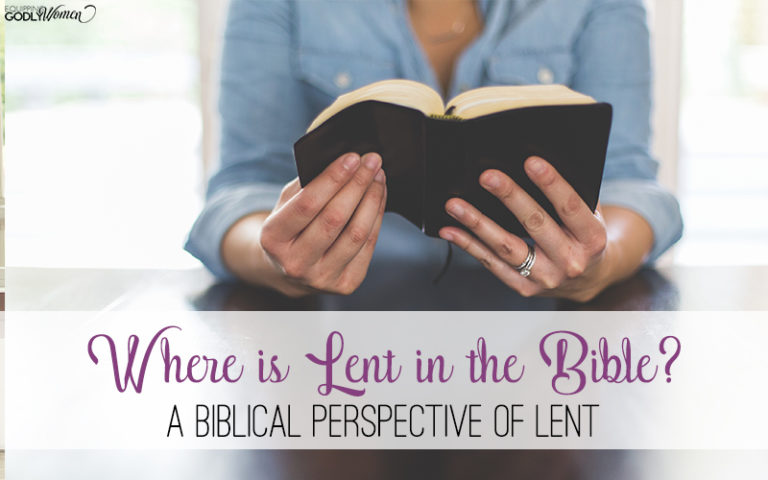Catholic Journey Update!
 It’s hard to believe it’s been almost THREE years now since I first starting sharing my journey through Protestant and Catholic Belief with you!
It’s hard to believe it’s been almost THREE years now since I first starting sharing my journey through Protestant and Catholic Belief with you!
At the time, I was just beginning to realize how much of the religion I was taught as a child was wrong, and I was just beginning to look into the claims of the Catholic Church to see how much merit they held, if any.
I did a LOT of research during this time, and I learned a TON.
And over the course of a few months, you journeyed with me as I really dove into Scripture to see what the Bible REALLY had to say about issues such as whether or not faith alone is enough, whether the church or the Bible has the ultimate authority and whether we should be baptized as infants or adults.
Not only did these posts really help me think through some very important issues, but I’ve heard from several of you that they’ve really helped you too!
In fact, my post on 10 Common Catholic Church Myths that Critics Believe is STILL one of the most highly trafficked posts on this site, and it continues to bring in new readers all the time!
Well, now that it’s been almost three years since I wrote the last article in the series, I thought it was high time that I give everyone who is curious an update — especially since so many of you have been emailing me asking for one.
Hopefully this post will answer your questions!
Did I End Up Converting to Catholicism? (And why not?)
No, I never ended up converting.
I went through almost all of RCIA* until the week when they wanted me to stand up in front of God and the entire church and say that I believe that 100% of everything the Catholic Church teaches is 100% correct.
And well… I can’t say that.
*Note: For those of you who are unfamiliar, RCIA stands for “Rite of Christian Initiation of Adults” — It’s a class taught by Catholic churches for anyone interested in Catholicism or considering converting.
I do believe that there is a “100% Truth” out there, but in order for me to be able to determine if the Catholic Church is 100% correct, I’d have to know what that 100% Truth is AND every single thing the Catholic Church teaches so that I can compare the two and see if they match up.
And seeing as how I’m not God… how could I possibly know for 100% sure what that 100% Truth is?
Honestly, it would feel pretty arrogant for me to say “I know the 100% Truth” — as if I were soo smart and could somehow figure it all out.
There are some seriously, seriously SMART Catholics, Protestants (and even Atheists!) out there who all debate and still can’t figure things out. They all have great arguments, and still land on every different side of the debate. If they can’t figure it out, how could I possibly?
And I know, I know. This is where my Catholic husband and the priest tell me “Well, you have to have faith.” And they’re right. We’ll never know for sure and there does need to be some measure of faith. BUT — I just don’t have that kind of faith in the Catholic Church (or any particular church, for that matter).
So… that’s where I’m stuck with that.
There’s nothing in particular that I really object to (though there are several things that aren’t my personal preference). I’m just not convinced.
I do continue to pray and plan to do much more research though – especially into the early church fathers – so who knows… maybe there’s still hope for me yet 🙂
So… How Does That Work? If You and Your Husband Believe Different Things?
Well, what you have to understand is that despite my husband and I having different “labels” (he’s Catholic, I’m not) 98% of what we believe and the way we practice our faith is the same, and the parts that are different really don’t make a huge difference in day-to-day life.
We both pray, read our Bibles and attend church regularly. We both seek to live God-honoring lives and pretty much agree on what that looks like. We both care a great deal about raising our children in the faith.
And for the things we differ on, we tend to be pretty accepting of each other’s beliefs. We find ways to make it work and to incorporate the best of both worlds.
For example:
- We go to Catholic Mass on Sundays. He tried my church for a while. Now we regularly attend his. It isn’t my first choice personally, but his church is important to him and going to church together is important to me.
- Our kids go to a Protestant preschool and a Catholic elementary school. They’ve also attended Protestant Sunday School and Catholic Vacation Bible School. Not to keep things 50/50, but because we both felt those were the best schools/programs for our children in our area.
- Our kids learn both Catholic and Protestant songs and prayers – just depending on whoever happens to be singing or praying with them at the time. I may not care to pray the rosary personally, but will it harm my children if they learn it? Hardly.
I’m totally supportive of my husband going to confession, praying the rosary or wanting to display a cross in our home – even though those aren’t the ways I typically worship. And he’s totally fine with me reading Protestant books, listening to Protestant music and teaching our kids all the songs and Bible stories I grew up learning.
My husband and I aren’t two enemies competing to get our own way. We’re two Christian adults each trying to grow in faith personally and do what’s best for our families as a whole. And when we disagree, we find a way to work together to find a solution we can all agree with.
What Advice Do You Have for Couples Who…?
Of course, this is just what has worked best for MY marriage. Your marriage might need something different.
If you and your spouse are also trying to navigate a marriage in which you believe two different things (or one or both of you is considering changing beliefs), you might find one of these articles helpful instead:
What to Do When You And Your Husband Have Differing Beliefs (For differing denominations)
Unequally Yoked Marriage? What to Do When Your Spouse Isn’t a Believer
So hopefully that answers some of your questions…
Still have more questions for me about my journey or how my husband and I make it work? Leave them in the comment section below!









Hi Brittany! It seems you have done a lot of research into Catholicism, and I commend you for being so thoughtful about it. One thing I was wondering, however, is if you spoke with or read anything from people who converted FROM Catholicism TO a different denomination. Perhaps understanding their reasoning behind it would help you in your search for that “100% Truth”. Have you heard of Mike Gendron? He puts out a monthly newsletter called “Proclaiming the Gospel” and has been on various Christian podcasts and videos. Here’s a link to his September 2022 newsletter.
https://myemail.constantcontact.com/The-False-Christ-of-Roman-Catholicism.html?soid=1103609831924&aid=-5W8Tj4TDd0
Hopefully he can shed some light on why people leave the RCC.
Blessings to you in the New Year!
Hi! Yes, I have. Unfortunately, everything I’ve read is either based on misunderstanding/misconceptions about what the Catholic Church actually teaches or is quite inflammatory/hateful in tone. While I am not convinced that Catholicism is correct (and I do have a few specific objections that prevent me from wholeheartedly accepting it), I have yet to find any Protestant document that does a great job of disproving it either.
Hi Brittany Ann,
I can’t thank you enough for your blogs. I happened upon them this morning while looking up “Common Misconceptions about the Catholic Church” for my teens’ Confirmation Class I teach at home. How incredible and amazing I found my information from a Protestant sister !!! THANK YOU !!!
I read your update above. I met my husband at 23. When we first met and realized we were interested in the other, we had some great chats. He was a very confident, humble and holy CATHOLIC man. He oozed JOY from everywhere in him. I was so intrigued. He never asked me to be Catholic too. In fact, he never even asked me to attend Mass with him. I found that odd but one day I asked if I could go to Mass with him. I never felt so lost not knowing what to do or say. But I began to learn more. I couldn’t stop learning. Many times I felt like I was drinking from a fire hydrant but I kept going. I entered RCIA and while I was ‘learning’ there, my “would be husband” was my sponsor. We lived in Vermont (very liberal thinking) and while I think the lady who taught me did try her best, my “would be husband” VERY often would have to re-teach me things we heard in class because she just wasn’t teaching quite accurately to what the Catholic Church taught on certain subjects. I happened upon Scott Hahn and read his ROME SWEET HOME & THE LAMBS SUPPER books and learned a plethora from him in his talks and other books because he was a faithful protestant minister with NO DESIRE to convert to the “whore of babylon.” Well, when you earnestly seek truth, God reveals truth. And Dr. Scott Hahn has been a Catholic, a Catholic Professor and a Catholic apologtist since the 1980s. I’ve been a Catholic since 2000. Married 24 years with 9 children living now with the same confidence and joy as my husband when I first met him.
That’s just a smidge of my story I wanted to share with you. When I read your update above, there was just one more thing from my story I wanted to share with you.
I came to a point when I realized I actually believed tons now that I hadn’t before BECAUSE the Catholic Church could back up their teachings TO the first century (Hello Church Fathers) and that held a ton of weight for me. The stuff I was still held up on, well the decision I made was that I was going to believe ALL of what Holy Mother Church taught or I was going to believe NONE of it. I could either trust the Catholic Church to teach 100% truth or I couldn’t trust her at all. Who can trust information from any teacher with part-truth? And so I stood in front of the Catholic Church and gave my profession of faith, I took that ONE STEP towards Christ in a new way and that’s all He needed from me. For 24 years, I have been letting the Holy Spirit do what the Holy Spirit does best – lead us closer to God, God’s love AND His truth. It’s a slow process but when we are intentional and consistent to continue to learn- it is ALL there. I came to see that I didn’t need PROOF on the stuff that held me up. I just needed to be willing to believe it. The proof came to my heart some time later, in non-physical, non visual ways. No Christian can prove or understand the Holy Trinity, but every Christian believes and stands by it – which funny to me – – – is NO WHERE in Sacred Scripture.
Lastly, one thing I came to see much more recently that only concreted my faith in Christ and His Church He established was when I was being trained as an extraordinary minister of holy communion. We were taught to watch the person CONSUME the host because too often it happens that a consecrated host is stolen from a Catholic Mass to be desecrated in a BLACK MASS by satanists. The truth that slapped me in the face, not long ago, was that SATANISTS BELIEVE THAT ROUND UNLEAVENED WAFER OF WHEAT IS JESUS CHRIST, body, blood, soul & divinity. Since common sense tells me you can’t desecrate that which is not holy and that since those satanists around the WORLD come to steal ONLY from a Catholic Mass – NEVER from a protestant communion service, there MUST be truth to the transubstanciation that I can’t prove otherwise. Who knew satanists would help me hold tight to one of my biggest hang-ups as a Catholic. Lord, I believe. Help my unbelief. God bless you on your journey, sister
Thank you so much for sharing part of your story with me. I loved reading about your faith journey.
Hi Brittany,
Thank you for sharing your story. I have been exploring your website and I couldn’t find a place where you mention what you precisely still are not convinced of regarding the RCC? Can you share what you are not convinced of?
Hi Drew, there’s nothing in particular that I really object to. I just couldn’t stand in front of God and the church and say that I believe that 100% of everything the Catholic Church teaches is 100% correct.